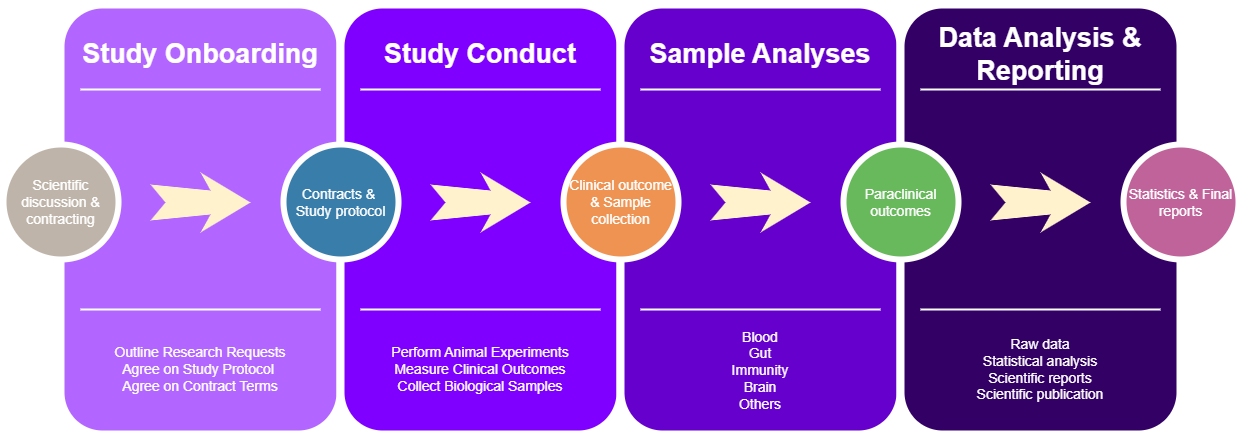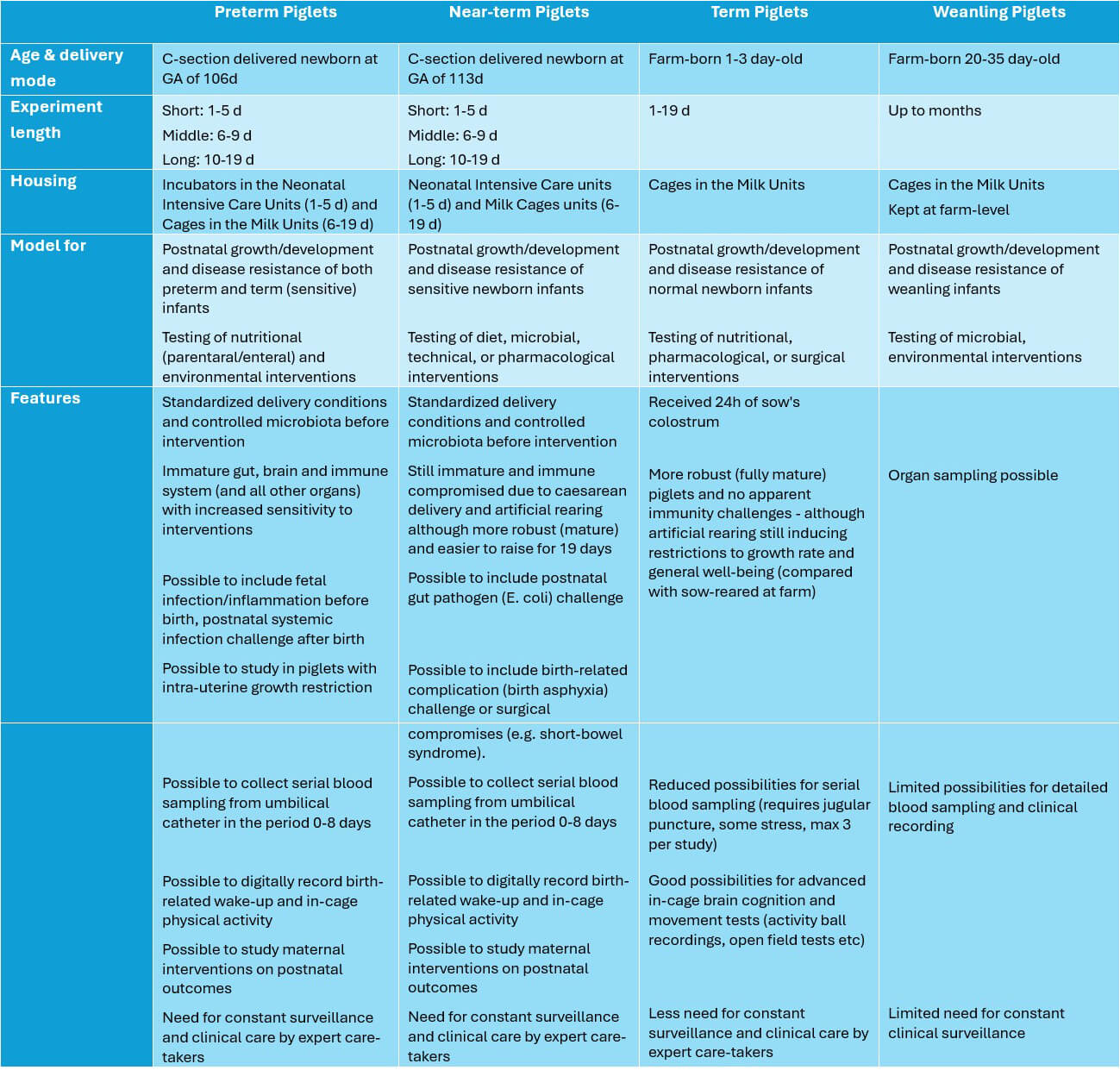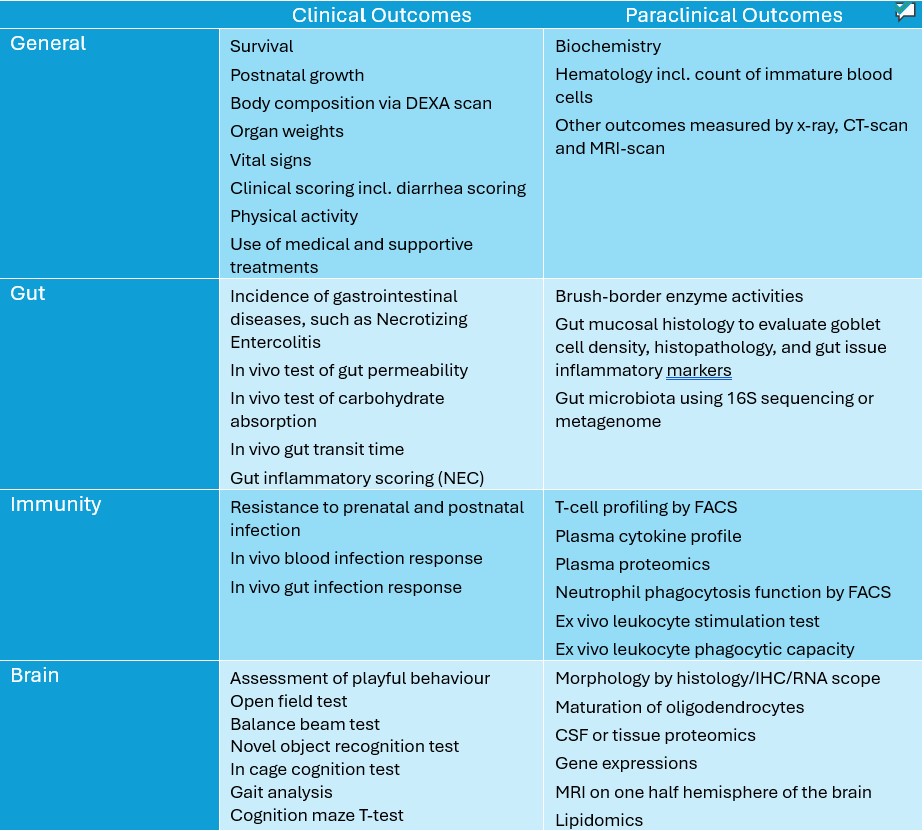NeoSearch
A platform for pre-clinical testing of pediatric pharmaceuticals, foods (infant formula, pre/probiotics, supplements) and medical devices in piglet models.
NeoSearch offers a platform for preclinical testing of pharmaceuticals, foods, and medical devices in specialized pediatric pig models. This includes testing a variety of interventions (e.g. pediatric drugs, infant formulas, pre/probiotics, dietary supplements). Endpoints include pharmacokinetics, toxicity, disease resistance, postnatal growth, and postnatal organ development of lungs, gut, liver, kidney, immunity, and brain in a range of specialized model designs.
Read more about our animal models and research areas here below.
Mission
NeoSearch offers pediatric piglet models to study drug or food effects on organs such as the gut, liver, brain, kidney, lungs and immune system. Our unique platform can mimic conditions like birth asphyxia, prematurity, intrauterine growth restriction, and perinatal infections. We can collect key tissue and offer a comprehensive range of laboratory analysis and bioinformatics services. We support life science companies in their preclinical development phase, helping them bring safe and effective treatments to market.
Vision
NeoSearch envisions a future where breakthroughs in neonatal and pediatric health are accelerated, leading to improved treatments and outcomes for infants and children. As a contract research group specializing in preclinical research using piglet models, NeoSearch is dedicated to supporting life science companies in their preclinical drug, food, and medical device development efforts.
Our Story
NeoSearch’s story begins in the early 00’s when Professors Per T. Torp Sangild and Thomas Thymann dedicated their research carrier to develop a preterm piglet model to help neonatologists and nutritionists understand why preterm infants develop the devastating disease, Necrotizing Enterocolitis (NEC), and how to feed them the best way. Their dedicated research fostered the formation of the research section, currently known as Comparative Pediatrics and Nutrition (CPN) consisting of approximately 25 employees. The research area was later extended to study effects of (milk) diets, nutrients, microbiota or pharmacological interventions on postnatal development on a number of organs including brain, lungs, gastrointestinal tract, kidney, liver and the immune system. Through the years, CPN has not only worked closely with Danish and international university and hospital partners, but also collaborated with a wide range of pharmaceutical and nutritional industry partners in their pre-clinical development of candidate drugs or new nutritional ingredients. The piglet models have become well recognized and are in high need by the industries, which has called on the establishment of an industrial collaboration focused platform based at CPN. With our 20+ years of experience in development of specialized neonatal piglet models, and research in interventions related to pharmacology, food, and microbes, we continue strive to produce high quality preclinical evidence, using a tailor-made facility for intensive and standard care of neonatal piglets under the NeoSearch platform.
Our Team
The management and scientific team of NeoSearch consists of Prof. Per T. Sangild and Prof. Thomas Thymann, the founders of the CPN section; Associate Prof. Yanqi Li, who started her research career at CPN as an industrial PhD student in 2010 focusing on pre-clinical and clinical research on how bioactive milk and its ingredients affect the gastrointestinal health in preterm piglets and infants; Associate Prof. Fei Gao, who started his research career in Genetics at Aarhus University as a PhD student and has collaborated with CPN since then to establish the omics analytical platform to explore and understand the mechanisms of disease before and after birth. The operational team consists of academic personnel at CPN, including PhD students, Post docs, Assistant and Associate Professors, and technical personnel, including laboratory technicians, animal care takers, and a project administrator.
NeoSearch provides services ranging from protocol writing, study conduct, sample analyses, to data analysis and reporting as shown in the workflow below. Based on the requirement of the sponsor, we can offer a full service including all aspects of the study from protocol writing to reporting, or individual services, such as designing the protocol, conducting the animal experiments based on a pre-defined protocol, or analyzing biological samples provided by sponsor, or a combination of the individual services. The specific services are to be outlined in the contract prior to the study’s initiation.

NeoSearch offers preclinical research using specialized pediatric piglet models to provide valuable data from drug or food interventions on disease resistance and development of organs such as the gut, liver, brain, and immune system. The piglet models and relevant publications are summarized in the table below.

Using our specialized pig models, interventions including candidate drugs for pediatric use, infant formulas, nutritional supplements, and pre-/probiotics can be tested to evaluate their effects on postnatal development and disease resistance. Pharmacokinetics and dose-response studies of candidate drugs can also be performed, as well as testing of medical devices for pediatric use. The specific outcomes are summarized in the table below together with relevant publications.

Compliance with animal welfare regulations and ethical guidelines is essential for NeoSearch's operations. Ensuring the well-being and ethical treatment of the piglet model is crucial to maintain the integrity and credibility of performing laboratory animal experiments. Following the requirements from FELASA, the Federation of European Laboratory Animal Science Associations, experiments are to be designed focusing on the 3Rs (Replacement, Reduction and Refinement) principle and the minimization of pain and discomfort. All experiments can first be performed at NeoSearch after receiving permission from The Animal Experiment Council in Denmark and staff performing the animal experiments is required to hold FELASA accredited certificate.
Research performed at NeoSearch also follows the ARRIVE and PREPARE guideline through the whole process from the protocol writing to the final reporting, which ensures the studies are reported in sufficient detail across all experiments.
Researchers
| Name | Title | Phone |
|---|
